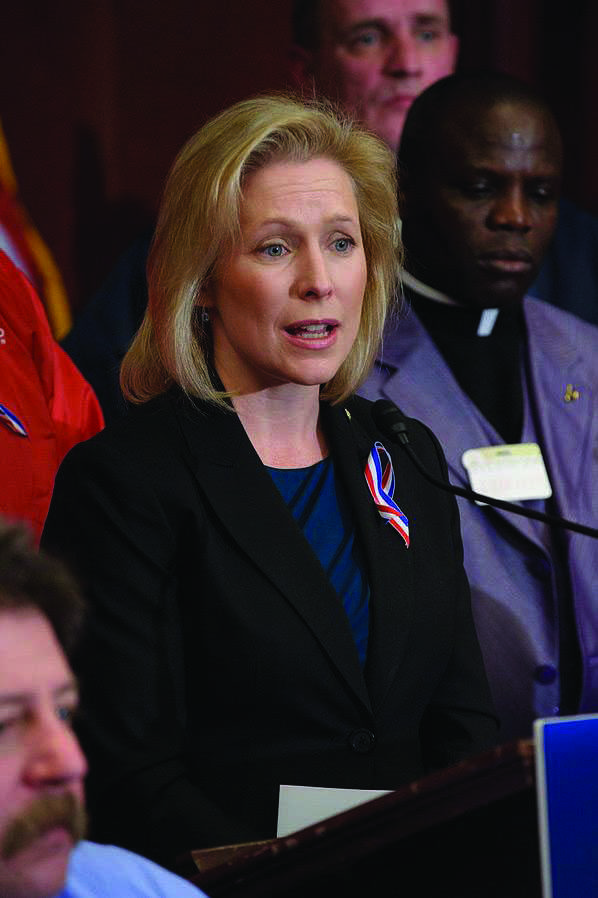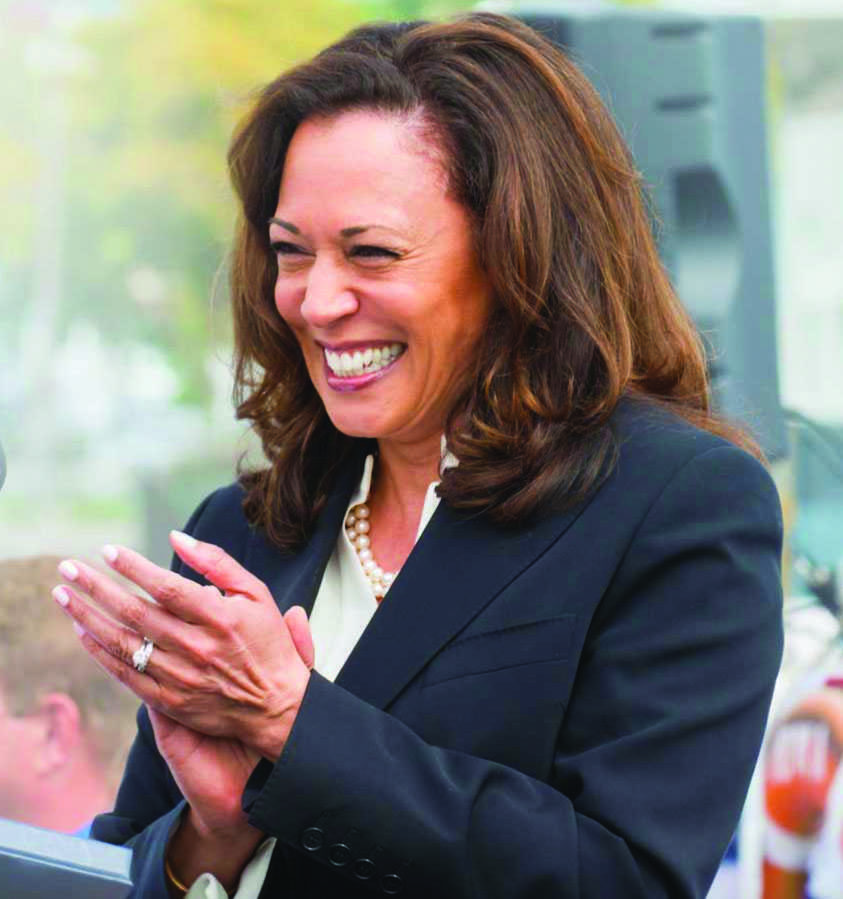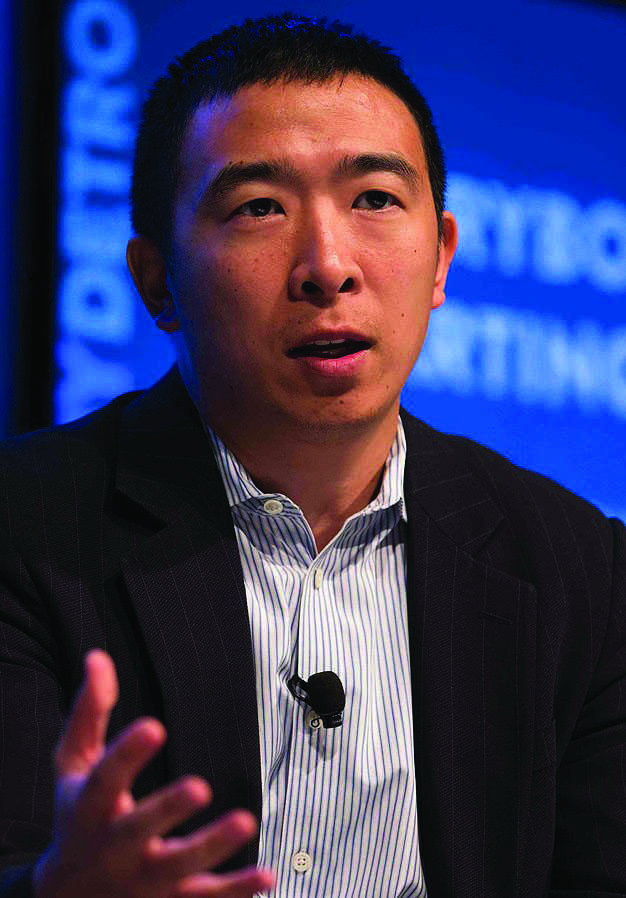In the lead up to the Democratic primary vote in 2020, a dizzying number of candidates have emerged to fight for the nomination. From old names with new agendas to left-field wildcards, every relevant contender comes with qualifications and baggage. The Franklin Post is here to provide some of that background. Candidates to cover were chosen based on RealClearPolitics polling averages from March 27, 2019.
Joe Biden:

The Good: Joe Biden is an early leader in the Presidential race, even if he has yet to announce his intent to run. Easily recognized through both a heavily publicized bromance with President Barack Obama and almost five decades of consistent presence in national politics, he is dominating the Democratic field and leading President Trump by 7.7 percent in recent polls.
As the former chair of the Senate Foreign Relations committee, Biden is well versed in international affairs and is prepared for possible conflicts. Domestically, he is known to reach across the aisle. During a partisan Obama presidency, he was effective in negotiating with congressional Republicans, brokering bipartisan deals that helped repair the economy after the 2008 recession.
The Bad: Between overstepping personal boundaries and compromising with Republicans during Clarence Thomas’ congressional hearings, Biden’s record has come under fire in a post #MeToo world. He has issued apologies for both instances.
During his time in the Senate, Biden made it more difficult for student debt to be forgiven during bankruptcy. This has created strife with college-age voters, who Biden himself has already criticized. “The younger generation now tells me how tough things are. Give me a break,” he told The Los Angeles Times. “No, no, I have no empathy for it.”
Biden has gone against his own party in the past. In 2018, he accepted $200,000 dollars to deliver a speech in support of a Republican House Candidate, drawing frustration from Democratic challengers.
At 76, Biden’s health is also an issue and a vice president choice is critical.
TLDR: While a strong politician with name recognition and ample experience, recent allegations and broken relationships have caused challenges to what was previously considered a shoo-in for Joe Biden.
Cory Booker

The Good: Cory Booker first made a name for himself as the young outspoken mayor of Newark, New Jersey. During his time as mayor, Booker saved his neighbor from a house fire and chased down a suspected bank robber. His goal was to bring life back into the struggling New Jersey city. However, throughout his seven years in office, unemployment rates and crime remained unchanged.
Up until 2006, Booker chose to live in a run-down apartment building in inner Newark which lacked hot water, heat, and an elevator. He now lives just blocks away in a new building where more than half his neighbors are below the poverty line. His commitment to connecting with the community has shaped his progressive policies such as marijuana legalization, criminal justice reform, and reducing income inequality.
The Bad: Cory Booker has garnered widespread criticism for previously accepting large amounts of money from Wall Street in 2014, and for strongly supporting charter schools. His campaign is also running off obtaining large support from African-American voters, and while that strategy helped Obama, Booker has to contend with another black candidate, Kamala Harris.
TLDR: Cory Booker is a young and optimistic candidate who has the potential to appeal to African-American and young Democratic voters. Again, like many others, Booker has to contend with a pool of strong Democratic candidates.
Pete Buttigieg:

The Good: Hailing from South Bend, Indiana, a small, once decaying post-industry town that was turned around, Mayor Pete Buttigieg (pronounced like “Buddha Judge”) is a young, middle American upstart. His platform, rooted in his Midwestern experience, is of hope and appropriation of traditionally conservative values like freedom.
The first millennial candidate, Buttigieg is a former Rhodes Scholar, a Harvard graduate, and Afghanistan veteran. In South Bend, he dropped unemployment from 11.8% to 4%.
He has been an outspoken critic of Democratic presidential strategy, remarking that Hillary Clinton was “ill-served” by the environment around her. Meanwhile, he’s challenged Vice President and Buttigieg statesman Mike Pence for his anti-gay rhetoric.
If elected, Buttigieg would be the first openly gay President. His husband, Chasten, has had among the most active social media presence of any candidate’s partner.
The Bad: Buttigieg lacks national experience and his specific policies are in their infancy. His relationship with his local African American community has been questioned, damaged by a decision as mayor to demote a police chief who unlawfully monitored discriminatory phone conversations between members of the force. Further, his numbers-based approach on housing has failed to address homelessness and the needs of some lower income communities.
TLDR: Buttigieg’s small town experience, quick wit, and progressive, practical values have shot him to notoriety, but can he compete with more established policy makers?
Julián Castro

The Good: Former San Antonio mayor and secretary of Housing and Urban Development (HUD) under the Obama administration, Julián Castro is a young and ambitious person who, if he wins, would be the first Latino presidential nominee. He got onto the political radar while serving as the mayor of San Antonio, but gained greater popularity after Hillary Clinton almost chose him as her 2016 running mate.
Castro is a strong voice in immigration reform and he wants to roll back President Trump’s immigration policies such as the Muslim ban and Trump’s border wall. His strong and vocal stance on immigration has attracted Latino voters, which are becoming more important to many Democratic candidates. Though Castro may not be a fan of “identity politics,” it may work in his favor.
The Bad: While Castro has had executive experience, it isn’t much, especially when compared to seasoned politicians like Joe Biden and Elizabeth Warren. He’s also going to need to garner some more support and develop his policies more in order to compete with other candidates like Cory Booker and Amy Klobuchar.
TLDR
Julián Castro is a former San Antonio mayor and secretary of Housing and Urban Development under Obama. His lack of support outside the Latino community and unclear position on some policies are not helping his case.
Kirsten Gillibrand

The Good: Senator Kirsten Gillibrand, the protégé of Hillary Clinton, runs on a progressive platform and is fighting for gender equity. As a public figure, she’s championed the #MeToo movement as the proponent behind the resignation of Democratic Senator Al Franken in February 2018. She is an effective policy creator and has been a major force in other successful campaigns, such as the repealing of Don’t Ask, Don’t Tell.
The Bad: Gillibrand has not shown consistency in policy throughout her political career.
During her campaign for a House of Representative seat in a traditionally conservative district, she adopted typically conservative policies. In office, she was a member of the Blue Dog Coalition, a group of centrist Democrats. She opposed gun regulation and national legalization of same sex marriage. However, when elected to be a Senator of New York, the greater, more liberal state, she flipped on many of these policies.
Gillibrand’s campaign has cited backlash from the Franken resignation to her trailing in donations among other Democratic hopefuls.
TLDR: Gillibrand’s campaign asks what’s more important for liberal voters—an effective progressive present or a past willingness to sacrifice beliefs for more voters.
Kamala Harris:

The Good: As a Presidential candidate, Democratic Senator Kamala Harris has run as a beacon of Californian progressive policies and values. As a Indian-American and Jamaican-American woman, she’s the face of a younger, more diverse party. As a former California Attorney General, she is hoping to bring her experience to the reformation of the criminal justice system. In the Golden State, she used her platform to create programs for greater police accountability.
The Bad: While Harris’ website claims that she “has spent her entire life defending our American values,” her record has been very contentious as a public official. She appealed the ban of the death penalty despite having personal beliefs against it, barred transgender prisoners from reassignment surgery, and failed to support improved police body camera standards, among other issues. A New York Times op-ed by Lara Bazelon even accused her of multiple times helping to uphold possibly false convictions.
TLDR: Harris’ rhetoric and record don’t always match, but her vision for America is clear and she is appealing to a young audience.
John Hickenlooper

The Good: John Hickenlooper is another oddball among the Democratic candidates. He’s a former geologist who left his profession to help start a successful Colorado brewery that helped bring in new development to a struggling Denver neighborhood.
From that business success, he turned to politics in 2003 and became a successful mayor and governor. As governor, he was able to enact contentious policies such as expanding Medicaid, gun control laws, and the state’s budget. Furthermore, during his tenure as governor, the unemployment rate fell from 9% to only 3%.
The Bad: Hickenlooper was known for his bipartisan work ethic, which could be a roadblock for his campaign and building a concrete position on certain policies. He has also received criticism for his support of fracking within Colorado and for his friendliness towards oil and gas companies.
TLDR: Contrary to President Donald Trump, John Hickenlooper is a successful self-made businessman with a very impressive track record to match. Although his campaign’s success remains to be seen, this isn’t the first time he’s been the underdog.
Jay Inslee (D)

The Good: Washington Governor Jay Inslee is an avid environmentalist who has spent decades advocating for and spearheading environmental policy. The tenured governor is making climate change central to his presidential campaign and using it as an umbrella issue for things like healthcare and national security to fall under.
Even as other candidates such as Bernie Sanders make climate change a larger part of their core issues, Inslee is able to point to his accomplishments rather than regular climate change rhetoric.
Inslee believes that climate change has the potential to provide countless jobs to Americans. He aims to establish policies to restrict emissions, spur government incentives for investment into clean infrastructure and research, and end fossil fuel subsidies.
The Bad: The same thing that is central to Inslee’s campaign may also be what does his campaign in. A common trend among smaller presidential campaigns is that they are still developing concrete policies, and Inslee’s is no exception. With an important debate coming this summer, he’ll need to find his way into the spotlights and cut away from the rest of the pack.
TLDR: Governor and avid environmentalist Jay Inslee is making climate change a central part of his campaign and is using it as an umbrella issue for things like healthcare and national security. However, he’s got a long way to a party nomination.
Amy Klobuchar

The Good: Among the large pool of Democratic candidates, 58 year-old Minnesota Senator Amy Klobuchar stands out as a non-traditional Democrat. She represents a much different demographic than other more left-leaning candidates and is attracting on the fence Republican voters.
She isn’t on the front lines of mainstream issues, but Klobuchar is leading efforts to cut prescription drugs costs, expand voting rights, and improve infrastructure.
The Bad: Multiple media outlets have reported on the mistreatment of her campaign staff. According to reports, she often berates her campaign aides for small slip-ups and mistakes and was known to throw office objects in frustration, sometimes in the direction of her staff.
TLDR: Klobuchar is a moderate midwestern Democrat who is running on “Minnesota Nice,” a stereotypical behavior of being well mannered and courteous. However, the verdict isn’t out as to whether or not it can carry her to a party nomination.
Beto O’Rourke

The Good: El Paso native, former punk musician, and skateboarder Beto O’Rourke made waves in Texas during his 2018 Senate run against incumbent Sen. Ted Cruz (R.) which fell short, as he lost to Cruz by 2 points.
O’Rourke’s biggest asset is his ability to excite audiences and motivate individuals to take action. His charismatic nature and ability to speak in front of crowds have led some to compare him to Obama in that regard.
The Bad
The enthusiasm surrounding his Senate run has begun to fade off, which was made apparent during his recent visit in Iowa. There he had lower turnout at his events, which is a bad sign if it’s happening this early in his campaign.
O’Rourke has an unsightly arrest record, first being arrested for leaping a campus fence (charges were dropped) and another for driving while intoxicated. His DWI charges were dismissed after he completed a DWI program.
TLDR: O’Rourke is riding the energy left over from his Senate run and he’s lacking clear policy.
Bernie Sanders:

The Good: Bernie Sanders, a Senator from Vermont, is back after an unsuccessful presidential bid in 2016. In a party that has moved left since, he hopes to reproduce his momentum, tackling wealth inequality and wealth accumulation among the 1%.
He’s been preaching his vision of a more equitable America since becoming mayor of Burlington, a small town, in 1981. Before that, he marched in Civil Rights rallies. Sanders’ consistency is a positive in a field of candidates who are shedding centrist records and adopting his policies.
He’s raised millions more than other candidates from small donations, appealing to a young generation disillusioned by the political process and income disparity.
The Bad: While the most progressive senator, Sanders has also been among the least effective in passing legislation.
Further, his history with socialist organizations and Democratic Socialist branding has generated fear and scorn from Republicans and some Democrats. “Here in the United States, we are alarmed at calls to adopt socialism,” said President Donald Trump, in a section of his State of The Union while discussing Venezuela. “We are born free, and we will stay free,” he continued.
Released on April 15, Sanders’ tax returns reveal he is a millionaire as a result of sales from his book, Our Revolution. Questions directed at the Senator have challenged if this creates a conflict of interest.
At 77, Sanders is the oldest candidate to run for office, making health complications an active concern for the Presidency and a vice president choice critical.
TLDR: “Red Scare” aside, Sanders’ specific vision of hope is even more popular today than in 2016.
Elizabeth Warren

The Good:
A Senator from Massachusetts, outspoken critic of President Trump, and close friend of Bernie Sanders, Elizabeth Warren is a progressive candidate with a short but strong political record. She’s challenged big business, grilled banks and introduced the Accountable Capitalism Act in August 2018.
While similar in policy to Sanders, she is both younger and more effective at passing legislation in the Senate. Her primary issues are income disparity and holding Wall Street accountable, and she’s made reforming the election system to prevent corruption a campaign promise.
The Bad:
In 2018, Warren accepted a challenge from President Trump to take a DNA test in order to prove her Native American heritage. She was then criticized by native activists, including the Cherokee Nation’s Chuck Hoskin Jr., who accused her of “undermining tribal interests with her continued claims of tribal heritage.”
Warren has also faced accusations of socialism by members of Wall Street and Republicans, ignited by her call for a ‘wealth tax’—taxing the rich based off of assets as well as annual income. Such a tax exists in Europe.
TLDR: Elizabeth Warren is a committed, effective far left Democrat who faces the same challenges as Bernie Sanders: a public fear of socialism.
Andrew Yang:

The Good: Andrew Yang’s ideas, distinct career background, and calls for “Human Capitalism,” a more equitable economic system.
A successful entrepreneur, Yang founded Venture for America, a non-profit aimed at “creating economic opportunity in American cities by mobilizing the next generation of entrepreneurs.”
Yang’s central platform is the “freedom dividend,” a universal basic income. The system, designed to ensure quality of life and prepare for increased joblessness in the face of automation, would grant every American $1000 a month just for being a citizen. Such a system exists in the state of Alaska.
The Bad: The freedom dividend would cost over a trillion dollars, making it difficult to implement. Alaska’s system is only possible due to the use of funds from oil reserves in the state. Yang proposes creating a value added tax and taxing large businesses in order to solve this.
Since Andrew Yang’s ideas are so eccentric, they are ripe for misinterpretation. A The Daily Show interview from Ronny Chieng openly mocked his platform. “Oh my god! Artificial intelligence? Robots? That’s your thing?” Chieng asked. He later played a fake ad claiming that “Andrew Yang will stop robots from banging your wife and becoming your son’s new dad.”
Yang also made questionable interview appearances, such as on the Joe Rogan Experience, which has also been a platform for white nationalists like Milo Yiannopoulos, and The Ben Shapiro Show, headed by the titular, far-right host who has repeatedly called being transgender a mental disorder.
TLDR: Yang’s freedom dividend presents a unique platform, but has been mostly undercut by its own difficulty to explain.
































